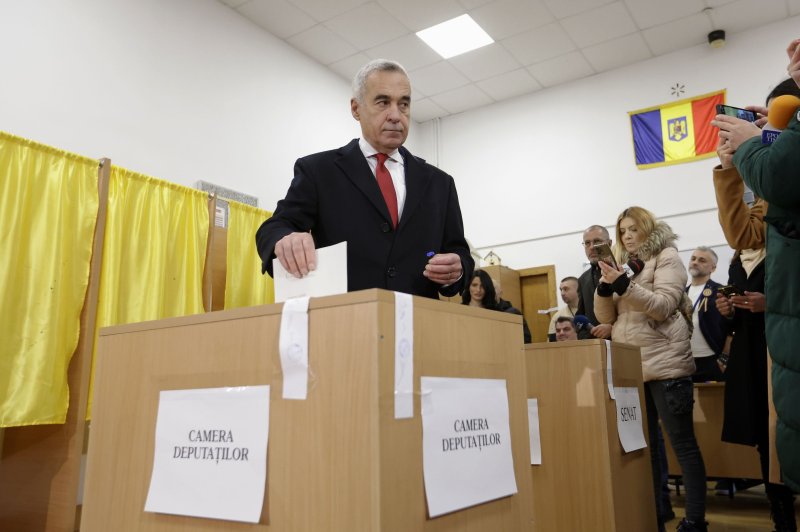Romanian far-right independent runoff candidate Călin Georgescu casts his ballot for the parliamentary elections in Mogosoaia village, near Bucharest, Romania, December 1, 2024. On Wednesday, Romanian presidency released declassified documents revealing Georgescu benefited from suspected Russian election interference campaign. Photo by Robert Ghement/EPA-EFE
Dec. 4 (UPI) — The United States said it is “concerned” by declassified reports from Romanian intelligence agencies that claim Russia has been interfering in the eastern European country’s election.
“We have been closely following the elections in Romania. It is the choice of the Romanian people whom they elect, and the United States does not interfere with that choice or process,” U.S. State Department spokesman Matthew Miller said Wednesday in a statment.
“We are concerned by the Romanian Supreme Council for National Defense (CSAT)’s report of Russian involvement in malign cyber activity designed to influence the integrity of the Romanian electoral process.”
The Romanian presidency declassified five reports earlier Wednesday that reveal an illegal and “aggressive promotional campaign” was conducted on social media platform TikTok to boost the popularity of pro-Russian ultranationalist presidential candidate Călin Georgescu.
Georgescu — who has praised Russian President Vladimir Putin while being critical of NATO — unexpectedly won the first round of Romania’s presidential election late last month.
Referred to as the TikTok candidate over his successful campaign, Georgescu was relatively unknown ahead of the election.
The reports declassified Wednesday state that Georgescu’s rapid rise in opinion polls “was driven by a coordinated popularity-boosting campaign” that significantly intensified its efforts two weeks before the Nov. 24 election.
According to the reports, polls conducted between Oct. 30 and Nov. 5 showed less than 1% of those surveyed intended to vote for Georgescu. However, he would go on to win the first round of the presidential election with more than 22% of the vote.
The TikTok influence campaign consisted of an initial 25,000 accounts that became active two weeks before the election. The reports state that of those accounts, nearly 800 had been created as early as 2016 and were dormant until Nov. 11.
“The promotion campaign was exceptionally well-organized, leading to a significant increase in follower numbers,” one of the reports stated.
Though the reports do not say Russia is responsible they do point toward the Kremlin as being the “state-sponsored cyber actor” behind the campaign.
One report states: “The method of operation and the scale of the cyber campaign lead to the conclusion that the attacker has considerable resources, correlating with a state-sponsored attacker’s modus operandi.”
Georgescu has reportedly claimed in a TV interview that the release of the documents was intended to hobble his campaign ahead of the second round of the presidential election, which is to be held Sunday.
“I think it’s the first time in the history of the world when a state is organizing an action against a candidate to stop him from running,” he said.
Prime Minister Marcel Ciolacu, who finished third in the election, said in a statement that he was the most affected by Georgescu’s alleged artificial increase in exposure.
“I hope that, based on the evidence published today, the state authorities will do their job, and all those responsible will be held accountable!” he said.
Ciolacu added that he will support reformis candidate Elena Lasconi to defeat Georgescu.
“We must overcome the wave of hatred that has been eating away at us for 20 years and focus, together, on a great national goal — continuing Romania’s European development path!” he said.
“This is what both Romanians living in the country and those living in the West expect from us, as they conveyed through their recent vote that we must continue to build a strong and dignified state, capable of fighting for the rights of Romanians, wherever they live in the world!”
